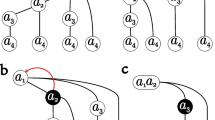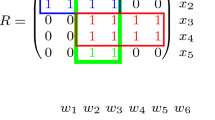Abstract
Formal Concept Analysis (FCA) looks to decompose a matrix of objects-attributes into a set of sparse matrices capturing the underlying structure of a formal context. We propose a Rank Reduction (RR) method to prime approximate FCAs, namely RRFCA. While many existing FCA algorithms are complete, lectic ordering of the lattice may not minimize search/decomposition time. Initially, RRFCA decompositions are not unique or complete; however, a set of good closures with high support is learned quickly, and then, made complete. RRFCA has its novelty in that we propose a new multiplicative two-stage method. First, we describe the theoretical foundations underpinning our RR approach. Second, we provide a representative exemplar, showing how RRFCA can be implemented. Further experiments demonstrate that RRFCA methods are efficient, scalable and yield time-savings. We demonstrate the resulting methods lend themselves to parallelization.
Access this chapter
Tax calculation will be finalised at checkout
Purchases are for personal use only
Preview
Unable to display preview. Download preview PDF.
Similar content being viewed by others
References
Wille, R.: Restructuring Lattice Theory: An Approach Based on Hierarchies of Concepts. In: Rival, I. (ed.) Ordered Sets, Reidel, pp. 445–470 (1982)
Ganter, B., Wille, R.: Formal Concept Analysis: Mathematical Foundations. Springer, Heidelberg (1999)
Xu, B., de Fréin, R., Robson, E., Ó Foghlú, M.: Distributed Formal Concept Analysis Algorithms Based on an Iterative MapReduce Framework. In: Domenach, F., Ignatov, D.I., Poelmans, J. (eds.) ICFCA 2012. LNCS, vol. 7278, pp. 292–308. Springer, Heidelberg (2012)
Ekanayake, J., Li, H., Zhang, B., Gunarathne, T., Bae, S.H., Qiu, J., Fox, G.: Twister: A Runtime for Iterative MapReduce. In: Hariri, S., Keahey, K. (eds.) HPDC, pp. 810–818. ACM (2010)
Lakhal, L., Stumme, G.: Efficient Mining of Association Rules Based on Formal Concept Analysis. In: Ganter, B., Stumme, G., Wille, R. (eds.) Formal Concept Analysis. LNCS (LNAI), vol. 3626, pp. 180–195. Springer, Heidelberg (2005)
Polaillon, G., Aufaure, M.A., Grand, B.L., Soto, M.: FCA for Contextual Semantic Navigation and Information Retrieval in Heterogeneous Information Systems. In: DEXA Workshop, pp. 534–539 (2007)
Snásel, V., Horak, Z., Kocibova, J., Abraham, A.: Analyzing Social Networks Using FCA: Complexity Aspects. In: Web Intelligence/IAT Workshops 2009, pp. 38–41 (2009)
Ganter, B.: Two Basic Algorithms in Concept Analysis. Formal Concept Analysis, 312–340 (1984)
Lindig, C.: Fast Concept Analysis. In: Ganter, B., Mineau, G.W. (eds.) ICCS 2000. LNCS, vol. 1867, pp. 235–248. Springer, Heidelberg (2000)
Kuznetsov, S.O.: A Fast Algorithm for Computing All Intersections of Objects in a Finite Semi-Lattice. Automatic Documentation and Mathematical Linguistics 27(5), 11–21 (1993)
Andrews, S.: In-Close, A Fast Algorithm for Computing Formal Concepts. In: 17th Int. Conf. on Conceptual Structures (2009)
Vychodil, V.: A New Algorithm for Computing Formal Concepts. Cybernetics and Systems, 15–21 (2008)
Krajca, P., Outrata, J., Vychodil, V.: Parallel Recursive Algorithm for FCA. In: CLA 2008, vol. 433, pp. 71–82 (2008)
Kuznetsov, S.O., Obiedkov, S.A.: Comparing Performance of Algorithms for Generating Concept Lattices. J. of Exper. and Th. Artif. Intell. 14, 189–216 (2002)
Bordat, J.P.: Calcul pratique du treillis de Galois d’une correspondance. Mathématiques et Sciences Humaines 96, 31–47 (1986)
Berry, A., Bordat, J.P., Sigayret, A.: A Local Approach to Concept Generation. Annals of Mathematics and Artificial Intelligence 49(1), 117–136 (2006)
Norris, E.M.: An Algorithm for Computing the Maximal Rectangles in a Binary Relation. Rev. Roum. Math. Pures et Appl. 23(2), 243–250 (1978)
Dowling, C.E.: On the Irredundant Generation of Knowledge Spaces. J. Math. Psychol. 37, 49–62 (1993)
Godin, R., Missaoui, R., Alaoui, H.: Incremental Concept Formation Algorithms Based on Galois (Concept) Lattices. Computational Intelligence 11, 246–267 (1995)
Carpineto, C., Romano, G.: A Lattice Conceptual Clustering System and Its Application to Browsing Retrieval. Machine Learning, 95–122 (1996)
Valtchev, P., Missaoui, R., Lebrun, P.: A Partition-based Approach Towards Constructing Galois (concept) Lattices. Discrete Mathematics, 801–829 (2002)
Yu, Y., Qian, X., Zhong, F., Li, X.R.: An Improved Incremental Algorithm for Constructing Concept Lattices. Software Engineering, World Congress 4, 401–405 (2009)
Krajca, P., Vychodil, V.: Distributed Algorithm for Computing Formal Concepts Using Map-Reduce Framework. In: Adams, N.M., Robardet, C., Siebes, A., Boulicaut, J.-F. (eds.) IDA 2009. LNCS, vol. 5772, pp. 333–344. Springer, Heidelberg (2009)
Dean, J., Ghemawat, S.: MapReduce: Simplified Data Processing on Large Clusters. Commun. ACM 51(1), 107–113 (2008)
Lee, D.D., Seung, H.S.: Algorithms for non-negative matrix factorization. In: NIPS, pp. 556–562. MIT Press (2000)
Lewicki, M.S., Sejnowski, T.J., Hughes, H.: Learning overcomplete representations. Neural Computation 12, 337–365 (1998)
Hoyer, P.O.: Non-negative sparse coding. In: Proc. IEEE Workshop on Neural Networks for Signal Processing, pp. 557–565 (2002)
Caspard, N., Monjardet, B.: The Lattices of Closure Systems, Closure Operators, and Implicational Systems on a Finite Set: A Survey. Disc. Appl. Math., 241–269 (2003)
de Fréin, R., Rickard, S.T.: Learning speech features in the presence of noise: Sparse convolutive robust non-negative matrix factorization. In: IEEE 16th Int. Conf. on Dig. Sig. Process., pp. 1–6 (2009)
Drakakis, K., Rickard, S., de Fréin, R., Cichocki, A.: Analysis of financial data using non-negative matrix factorization. J. Int. Math. Forum 3(38), 1853–1870 (2008)
Author information
Authors and Affiliations
Editor information
Editors and Affiliations
Rights and permissions
Copyright information
© 2013 Springer-Verlag Berlin Heidelberg
About this paper
Cite this paper
de Fréin, R. (2013). Formal Concept Analysis via Atomic Priming. In: Cellier, P., Distel, F., Ganter, B. (eds) Formal Concept Analysis. ICFCA 2013. Lecture Notes in Computer Science(), vol 7880. Springer, Berlin, Heidelberg. https://doi.org/10.1007/978-3-642-38317-5_6
Download citation
DOI: https://doi.org/10.1007/978-3-642-38317-5_6
Publisher Name: Springer, Berlin, Heidelberg
Print ISBN: 978-3-642-38316-8
Online ISBN: 978-3-642-38317-5
eBook Packages: Computer ScienceComputer Science (R0)




